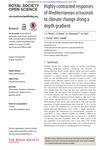Please use this identifier to cite or link to this item:
http://lib.hpu.edu.vn/handle/123456789/22405Full metadata record
| DC Field | Value | Language |
|---|---|---|
| dc.contributor.author | Pivotto, I. D. | en_US |
| dc.contributor.author | Nerini, D. | en_US |
| dc.contributor.author | Masmoudi, M. | en_US |
| dc.date.accessioned | 2016-07-30T01:39:21Z | |
| dc.date.available | 2016-07-30T01:39:21Z | |
| dc.date.issued | 2015 | en_US |
| dc.identifier.other | HPU4160508 | en_US |
| dc.identifier.uri | https://lib.hpu.edu.vn/handle/123456789/22405 | en_US |
| dc.description.abstract | Climate change has a strong impact on marine ecosystems, including temperate species. Analysing the diversity of thermotolerance levels within species along with their genetic structure enables a better understanding of their potential response to climate change. We performed this integrative study on the Mediterranean octocoral Eunicella cavolini, with samples from different depths and by means of a common garden experiment. This species does not host photosynthetic Symbiodinium, enabling us to focus on the cnidarian response. We compared the thermotolerance of individuals from 20 m and 40 m depths from the same site and with replicates from the same colony. | en_US |
| dc.format.extent | 11 p. | en_US |
| dc.format.mimetype | application/pdf | en_US |
| dc.language.iso | en | en_US |
| dc.subject | Biology | en_US |
| dc.subject | Ecology | en_US |
| dc.subject | Evolution | en_US |
| dc.subject | Genetics | en_US |
| dc.subject | Climate change | en_US |
| dc.subject | Adaptation | en_US |
| dc.subject | Acclimatization | en_US |
| dc.subject | Eunicella cavolini | en_US |
| dc.subject | Mediterranean sea | en_US |
| dc.subject | Population genetics | en_US |
| dc.title | Highly contrasted responses of Mediterranean octocorals to climate change along a depth gradient | en_US |
| dc.type | Article | en_US |
| dc.size | 918KB | en_US |
| dc.department | Education | en_US |
| Appears in Collections: | Education | |
Files in This Item:
| File | Description | Size | Format | |
|---|---|---|---|---|
| 0391_Highlycontrastedresponses.pdf Restricted Access | 918.07 kB | Adobe PDF |  View/Open Request a copy |
Items in DSpace are protected by copyright, with all rights reserved, unless otherwise indicated.
